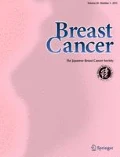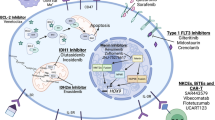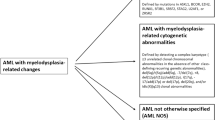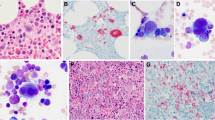Abstract
Background
Genetic risk factors for febrile neutropenia (FN), the major adverse event of perioperative chemotherapy for early breast cancer, remain unclear.
Methods
This study retrospectively explored pharmacogenetic associations of single nucleotide polymorphisms (SNPs) of the uridine glucuronosyltransferase 2B7 (UGT2B7, rs7668258), glutathione-S-transferase pi 1 (GSTP1, rs1695), and microcephalin 1 (MCPH1, rs2916733) genes with chemotherapy-related adverse events in 102 Japanese women who received epirubicin and cyclophosphamide as perioperative chemotherapy for early breast cancer.
Results
The allele frequencies for all of the SNPs were in concordance with the Hap-Map data of Japanese individuals. Among the 24 patients who had FN at least once during all courses of chemotherapy, 23 had the A/A genotype, and 1 had the A/G genotype of the GSTP1 polymorphism (rs1695, P = 0.001); 23 of the 70 patients with the A/A genotype had FN, as compared with only 1 of the 32 patients with the A/G and G/G genotypes. The genotype distributions of the UGT2B7 and MCPH1 polymorphisms did not differ between the patients who had FN or grade 3/4 neutropenia and those who did not.
Conclusion
Among Japanese women who received epirubicin and cyclophosphamide as perioperative chemotherapy for early breast cancer, those with the A/A genotype of the GSTP1 polymorphism (rs1695) were more likely to have FN.

Similar content being viewed by others
References
Innocenti F, Iyer L, Ramirez J, Green MD, Ratain MJ. Epirubicin glucuronidation is catalyzed by human UDP-glucuronosyltransferase 2B7. Drug Metab Dispos. 2001;29:686–92.
Innocenti F, Liu W, Fackenthal D, Ramirez J, Chen P, Ye X, et al. Single nucleotide polymorphism discovery and functional assessment of variation in the UDP-glucuronosyltransferase 2B7 gene. Pharmacogenet Genomics. 2008;18:683–97.
Sawyer MB, Damaraju S, Pituskin E, Damaraju V, Scarfe AG, Bies RB, et al. Uridine glucuronosyltransferase 2B7 pharmacogenetics predicts epirubicin clearance and myelosuppression. J Clin Oncol. 2009;27:15 s.(suppl; abstr 2504).
Dirven HA, van Ommen B, Van Bladeren PJ. Involvement of human glutathione S-transferase isoenzymes in the conjugation of cyclophosphamide metabolites with glutathione. Cancer Res. 1994;54:6215–20.
Zimniak P, Nanduri B, Pikula S, Bandorowicz-Pikula J, Singhal SS, Srivastava SK, et al. Naturally occurring human glutathione S-transferase GSTP1 isoforms with isoleucine and valine in position 104 differ in enzymic properties. Eur J Biochem. 1994;224:893–9.
Yao S, Barlow WE, Albain KS, Choi JY, Zhao H, Livingston RB, et al. Gene polymorphisms in cyclophosphamide metabolism pathway, treatment-related toxicity, and disease-free survival in SWOG 8897 clinical Trial for breast cancer. Clin Cancer Res. 2010;16:6169–76.
Srinvasan Y, Sasa M, Honda J, Takahashi A, Uno S, Kamatani N, et al. Genome-wide association study of epirubicin-induced leucopenia in Japanese patients. Phamacogenetics Genomics. 2011;21:552–8.
Ando Y, Fujita K, Sasaki Y, Hasegawa Y. UGT1A1 * 6 and UGT1A1 * 27 for individualized irinotecan chemotherapy. Curr Opin Mol Ther. 2007;9:258–62.
Saeki M, Saito Y, Jinno H, Tanaka-Kagawa T, Ohno A, Ozawa S, et al. Single nucleotide polymorphisms and haplotype frequencies of UGT2B4 and UGT2B7 in a Japanese population. Drug Metab Dispos. 2004;32:1048–54.
Lecomte T, Landi B, Beaune P, Laurent-Puig P, Loriot MA. Glutathione S-transferase P1 polymorphisms (Ile105Val) predicts cumulative neuropathy in patients receiving oxaliplatin-based chemotherapy. Clin Cancer Res. 2006;12:3050–6.
Mir O, Alexandre J, Tran A, Durand JP, Pons G, Treluyer JM, et al. Relationship between GSTP1 Ile (105) Val polymorphism and docetaxel-induced peripheral neuropathy: clinical evidence of a role of oxidative stress in taxane toxicity. Ann Oncol. 2009;20:736–40.
Inada M, Sato M, Morita S, Kitagawa K, Kawada K, Mitsuna A, et al. Association between oxaliplatin-induced peripheral neuropathy and polymorphisms of the ERCC1 and GSTP1 genes. Int J Clin Pharmacol Ther. 2010;48:729–34.
Zarate R, Gonzalez-Santigo S, de la Haba J, Bandres E, Morales R, Salgado J, et al. GSTP1 and MTHFR polymorphisms are related with toxicity in breast cancer adjuvant anthracycline-based treatment. Curr Drug Metab. 2007;8:481–6.
Braun MS, Richman SD, Thompson L, Daly CL, Meade AM, Adlard JW, et al. Association of molecular markers with toxicity outcomes in a randomized trial of chemotherapy for advanced colorectal cancer: the FOCUS trial. J Clin Oncol. 2009;27:5519–28.
Zhong S, Huang M, Yang X, Liang L, Wang Y, Romkes M, et al. Relationship of glutathione S-transferase genotypes with side effects of pulsed cyclophosphamide therapy in patients with systemic lupus erythematosus. Br J Clin Pharmacol. 2006;62:457–72.
Watson MA, Stewart RK, Smith GB, Massey TE, Bell DA. Human glutathione S-transferase P1 polymorphisms: relationship to lung tissue enzyme activity and population frequency distribution. Carcinogenesis. 1998;19:275–80.
Srivastava SK, Singhal SS, Hu X, Awasthi YC, Zimniak P, Singh SV. Differential catalytic efficiency of allelic variants of human glutathione S-transferase Pi in catalyzing the glutathione conjugation of thiotepa. Arch Biochem Biophys. 1999;366:89–94.
Adler V, Yin Z, Fuchs SY, Benezra M, Rosario L, Tew KD, et al. Regulation of JNK signaling by GSTp. EMBO J. 1999;18:1321–34.
Sawyer MB, Innocenti F, Das S, Cheng C, Ramirez J, Pantle-Fisher FH, et al. A pharmacogenetic study of uridine diphosphate-glucuronosyltransferase 2B7 in patients receiving morphine. Clin Pharmacol Ther. 2003;73:566–74.
Sanchez MB, Herranz JL, Leno C, Arteaga R, Oterino A, Valdizan EM, et al. UGT2B7_–161C > T polymorphism is associated with lamotrigine concentration-to-dose ratio in a multivariate study. Ther Drug Monit. 2010;32:177–84.
Parmar S, Stingl JC, Huber-Wechselberger A, Kainz A, Renner W, Langsenlehner U, et al. Impact of UGT2B7 His268Tyrpolymorphism on the outcome of adjuvant epirubicin treatment in breast cancer. Breast Cancer Res. 2011;13:R57.
Acknowledgments
This work was supported by the Japan Research Foundation for Clinical Pharmacology (71-014702).
Conflict of interest
The authors declare that they have no conflict of interest.
Author information
Authors and Affiliations
Corresponding author
About this article
Cite this article
Sugishita, M., Imai, T., Kikumori, T. et al. Pharmacogenetic association between GSTP1 genetic polymorphism and febrile neutropenia in Japanese patients with early breast cancer. Breast Cancer 23, 195–201 (2016). https://doi.org/10.1007/s12282-014-0547-x
Received:
Accepted:
Published:
Issue Date:
DOI: https://doi.org/10.1007/s12282-014-0547-x




